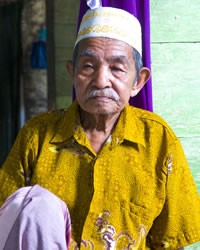Kioko-Kambowa in Indonesia

Photo Source:
Copyrighted © 2026
Anonymous All rights reserved. Used with permission |
Send Joshua Project a map of this people group.
|
| People Name: | Kioko-Kambowa |
| Country: | Indonesia |
| 10/40 Window: | Yes |
| Population: | 8,600 |
| World Population: | 8,600 |
| Primary Language: | Kioko |
| Primary Religion: | Islam |
| Christian Adherents: | 0.46 % |
| Evangelicals: | 0.00 % |
| Scripture: | Translation Started |
| Ministry Resources: | No |
| Jesus Film: | No |
| Audio Recordings: | No |
| People Cluster: | New Guinea |
| Affinity Bloc: | Pacific Islanders |
| Progress Level: |
|
Introduction / History
The Kioko-Kambowa people live in three contiguous districts: Kioko, Bonegunu and Kambowa. All three districts are in North Buton Regency in Central Sulawesi Province. In their homeland, the Kioko- Kambowa live together with the Muna and Kulisusu peoples. They most commonly use the Kioko language. This is part of the West Muna language group, which also includes Pancana, Muna, and Liabuku.
What Are Their Lives Like?
Most Kioko-Kambowa make a living by farming. They grow rice, maize, and yams as their main crops, with coconut and sago as secondary crops. The Kioko-Kambowa love socializing, as evidenced by the fact that almost every house has a large meeting room in front of the house or next to the house. The meeting rooms are of various sizes, but on average they measure between 3x3 meters and 5x3 meters. This room is normally used for receiving informal guests and visits from other villagers, for telling stories, doing casual work, or just "hanging out" to rest or pass the time. Formal guests, on the other hand, are received within the house itself.
Much of the coastline in Kioko and Kambowa districts is threatened by erosion. Many parts of the beach have been eroded by waves, such that it can be said this area has no longer has any beach. If this erosion is left unchecked, it will continue eroding topsoil and carrying it out to sea.
This problem is compounded by road conditions in the whole Kioko-Kambowa area, which are very poor. In some places they are very difficult to pass or even impassable. There are three access roads to this area. The road from Kioko-Kambowa to the town of Baubau is considered the best, although in many places it is severely damaged and slippery. The access road to Maligano and Ereka is the worst and is impassible when it rains.
The average economic condition of the community is middle to low. Most earn their living as farmers and builders. This is because they are mountain people who were forced to live on the coast by the Indonesian government during the rule of President Suharto (1967- 1998). Up to the present they have not been able to effectively exploit the potential of the sea.
What Are Their Beliefs?
The Kioko-Kambowa are all Muslim, but their lifestyles still reflect previous beliefs. They believe that during the first three months of a fetus's life, it is in the "womb" of its father, then for the next nine months it is in the womb of its mother. So the total time in the womb is 12 months. They also believe that no Kioko-Kambowa person who serves as a soldier has ever been killed, because they are supernaturally protected through "hand calculation," performed whenever they want to do something.
What Are Their Needs?
The Kioko-Kambowas need a greater desire for Christ.
Prayer Points
Pray that the Kioko-Kambowas will understand that they can never be saved by their own efforts.
Pray for their family leaders to have dreams of the risen and victorious Christ.
Pray for loving and dedicated workers to go to them.
Pray that soon there will be many Kioko-Kambowa disciples discipling others.